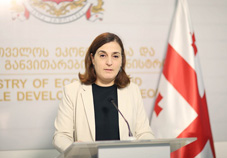National Statistics Office releases a preliminary estimate of Georgian economy
By Tsotne Pataraia
Friday, November 1


This information was announced at a briefing by Gogita Todradze (Director of Geostat): "According to preliminary estimates, in September 2019 the Georgian economy grew by 5.2%, with an average of 9 months at 5%," said Todradze.
In September 2018, economic growth was 5.6% and 4% in the third quarter. According to the National Statistics Office, in September 2019, compared to the same period of the previous year, growth was observed in construction, transport, trade, hotels and restaurants, manufacturing industry:
“It was precisely the construction, transport, trade, hotels, restaurants and manufacturing industries that showed a high turnover volume compared to the same period last year,” said Todradze.
There has been a decline in the mining and utilities, social and personal service sectors:
“Against the backdrop of overall growth, there has been a declining trend in the mining, utilities, personal and social services sectors. The number of newly registered enterprises has decreased by 1.4% to about 4,000 units," said Todradze
As he pointed out, in the first nine months of 2019, exports of goods increased by 11.1 percent to about $ 2.7 billion. As for imports, it declined by 3.3 percent to $ 6.5 billion.
Ekaterine Mikabadze, the First Deputy Minister of Economy and Sustainable Development, estimates that the high economic growth in September is another confirmation of the sound and consistent economic policy of the Georgian government, especially the stable macroeconomic environment, effective reforms and the increase in public capital spending.
According to Ekaterine Mikabadze, the positive prospects and expectations of the Georgian economy are also indicative of the fact that the rating company (S&P) has recently upgraded Georgia's sovereign rating, citing maintaining economic stability despite external challenges:
“The institutional strength of the country was also an important factor in improving the rating. Reforms planned for the coming and coming years will help improve the competitiveness of the private sector, which in turn will create new jobs and also make economic growth more inclusive,” said the First Deputy Minister.
